AR
-
 Symposium on Creative Education
KAIST and the Korea Society for Creativity and Application (KSCA) co-hosted a symposium on creative education on January 21, 2016 at the KAIST Business and Management College in Seoul. Along with the symposium, the two organizations also held the Korea "Theory of Inventive Problem Solving" (TRIZ) Festival 2016.
Around 200 experts from academia, industry, and research including Dong-Suk Kim, Dean of the KAIST College of Business and Management and Gui-Chan Park, Director of POSCO Group Academy, attended the symposium.
The event was organized to celebrate the foundation of KSCA and to increase social awareness of creative education and design-related thinking with a "TRIZ approach."
"TRIZ" stands for the “Theory of Inventive Problem Solving” in Russian. It is a problem-solving method based on logic and data, not intuition, which accelerates the project team’s ability to work out issues creatively. The "TRIZ approach" has been widely used among Korean companies including Samsung, LG, and POSCO as a means of boosting employees’ creativity.
The academic symposium was divided into a keynote speech, paper presentations from each field, and a poster fair.
Professor Dae-Sik Kim from KAIST delivered a keynote speech on “Neuroscience and Creativity,” offering a glimpse of the world from a neuroscience perspective. Jae-min Lee, a researcher at Samsung Electronics, provided an industrial case study, “Application of TRIZ for the Improvement of Refrigerator.” Professor Jung-Seok Hyun from Jeju University and Dr. Jung-Ho Shin from E-Triz System presented their application of TRIZ on “Limitless Imagination and Invention Class for the Elementary School Students.” Altogether, 36 other research papers and case studies were presented at the symposium.
Dr. Dong-ryul Yang, President of KSCA, said, “This academic symposium allows us to discuss a range of innovative case studies that utilize TRIZ in industrial and educational fields, from which we can learn good lessons and practices.”
2016.01.19 View 6640
Symposium on Creative Education
KAIST and the Korea Society for Creativity and Application (KSCA) co-hosted a symposium on creative education on January 21, 2016 at the KAIST Business and Management College in Seoul. Along with the symposium, the two organizations also held the Korea "Theory of Inventive Problem Solving" (TRIZ) Festival 2016.
Around 200 experts from academia, industry, and research including Dong-Suk Kim, Dean of the KAIST College of Business and Management and Gui-Chan Park, Director of POSCO Group Academy, attended the symposium.
The event was organized to celebrate the foundation of KSCA and to increase social awareness of creative education and design-related thinking with a "TRIZ approach."
"TRIZ" stands for the “Theory of Inventive Problem Solving” in Russian. It is a problem-solving method based on logic and data, not intuition, which accelerates the project team’s ability to work out issues creatively. The "TRIZ approach" has been widely used among Korean companies including Samsung, LG, and POSCO as a means of boosting employees’ creativity.
The academic symposium was divided into a keynote speech, paper presentations from each field, and a poster fair.
Professor Dae-Sik Kim from KAIST delivered a keynote speech on “Neuroscience and Creativity,” offering a glimpse of the world from a neuroscience perspective. Jae-min Lee, a researcher at Samsung Electronics, provided an industrial case study, “Application of TRIZ for the Improvement of Refrigerator.” Professor Jung-Seok Hyun from Jeju University and Dr. Jung-Ho Shin from E-Triz System presented their application of TRIZ on “Limitless Imagination and Invention Class for the Elementary School Students.” Altogether, 36 other research papers and case studies were presented at the symposium.
Dr. Dong-ryul Yang, President of KSCA, said, “This academic symposium allows us to discuss a range of innovative case studies that utilize TRIZ in industrial and educational fields, from which we can learn good lessons and practices.”
2016.01.19 View 6640 -
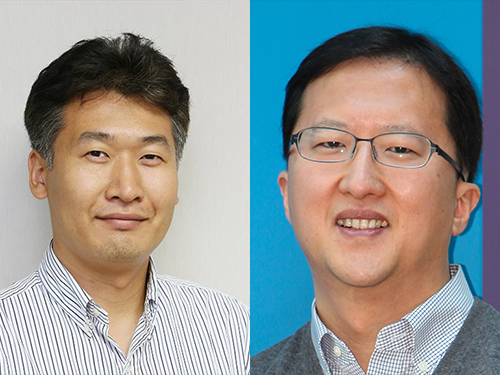 Professors Jeon and Choi Receive the Young Scientist Award
Professors Seokwoo Jeon of the Department of Materials Science and Engineering and Jang Wook Choi of the Graduate School of Energy, Environment, Water and Sustainability (EEWS) at KAIST received the Young Scientist Award.
The award ceremony took place at the Korea Press Center in Seoul. Presented by the Ministry of Science, ICT and Future Planning of Korea and the National Academy of Engineering of Korea, the Young Scientist Award is given to outstanding scientists under the age of 40 who have demonstrated excellence in their research in the field of natural science.
Each year the award is given to three scientists in different areas.
Professor Jeon was recognized for his achievement in creating a new property of materials. He studied synthesis and development of low-dimensional nanomaterials and developed a large area nanostructure.
Professor Choi’s research area was to discover optimal materials for rechargeable batteries. By applying his research, he developed rechargeable batteries with high efficiency, making the wearable system more feasible.
2016.01.11 View 12069
Professors Jeon and Choi Receive the Young Scientist Award
Professors Seokwoo Jeon of the Department of Materials Science and Engineering and Jang Wook Choi of the Graduate School of Energy, Environment, Water and Sustainability (EEWS) at KAIST received the Young Scientist Award.
The award ceremony took place at the Korea Press Center in Seoul. Presented by the Ministry of Science, ICT and Future Planning of Korea and the National Academy of Engineering of Korea, the Young Scientist Award is given to outstanding scientists under the age of 40 who have demonstrated excellence in their research in the field of natural science.
Each year the award is given to three scientists in different areas.
Professor Jeon was recognized for his achievement in creating a new property of materials. He studied synthesis and development of low-dimensional nanomaterials and developed a large area nanostructure.
Professor Choi’s research area was to discover optimal materials for rechargeable batteries. By applying his research, he developed rechargeable batteries with high efficiency, making the wearable system more feasible.
2016.01.11 View 12069 -
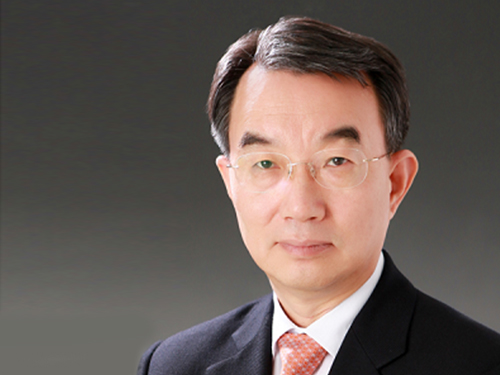 Professor Joonho Choe Appointed as the President of the KSMCB
Professor Joonho Choe of the Biological Sciences Department at KAIST has been elected the 25th president of Korean Society for Molecular and Cellular Biology (KSMCB).
His presidency will last one year, beginning on January 1, 2016.
Established in 1989, the Society has served as the largest academic gathering in the field of life sciences, holding an international conference every fall. It has more than 12,400 fellows.
Professor Choe served as the vice president of KSMC as well as the editor of its journal, Molecules and Cells.
He said, “The 2016 International Conference of the KSMCB will take place on October 12-14, 2016 at the COEX Convention and Exhibition Hall in Seoul. This year, we are preparing 20 symposiums and will invite four international renowned keynote speakers in the field including a Nobel Laureate. We hope many people, students and young researchers in particular, from academia and industry will join the conference.”
Professor Choe received his doctoral degree from the University of California, Los Angeles (UCLA) after graduating from Seoul National University with his bachelor and master’s degrees.
2016.01.05 View 8483
Professor Joonho Choe Appointed as the President of the KSMCB
Professor Joonho Choe of the Biological Sciences Department at KAIST has been elected the 25th president of Korean Society for Molecular and Cellular Biology (KSMCB).
His presidency will last one year, beginning on January 1, 2016.
Established in 1989, the Society has served as the largest academic gathering in the field of life sciences, holding an international conference every fall. It has more than 12,400 fellows.
Professor Choe served as the vice president of KSMC as well as the editor of its journal, Molecules and Cells.
He said, “The 2016 International Conference of the KSMCB will take place on October 12-14, 2016 at the COEX Convention and Exhibition Hall in Seoul. This year, we are preparing 20 symposiums and will invite four international renowned keynote speakers in the field including a Nobel Laureate. We hope many people, students and young researchers in particular, from academia and industry will join the conference.”
Professor Choe received his doctoral degree from the University of California, Los Angeles (UCLA) after graduating from Seoul National University with his bachelor and master’s degrees.
2016.01.05 View 8483 -
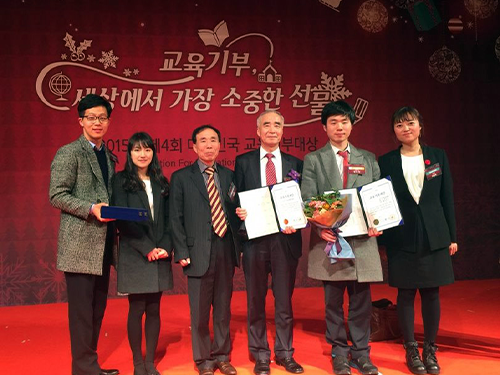 KAIST Wins the Korea Donation for Education Awards 2015
KAIST received the grand prize for the university section at the Korea Donation for Education Awards 2015. The award ceremony took place at Seoul Plaza Hotel on December 15, 2015.
The Ministry of Education created the award in 2012 to raise awareness about the need for charitable donations for education and to encourage the public’s participation in such endeavors. Recipients have included private companies, public institutions, non-profit organizations, universities, and individuals who have made notable contributions to education, for example, by offering educational programs or fundraising for such programs throughout a year.
Many organizations within KAIST, including the KAIST Center of Donation for Education, the Midam Scholarship Committee, the Donation for Software Education Group, the Chalk Academy, KAIST Student Volunteers, and K-LET, have been collectively recognized for their efforts to develop educational materials and managing academic camps and programs.
In addition to the grand prize which KAIST won, the Ministry of Education gave Neung-In Jang, a student pursuing a social entrepreneurship MBA at KAIST, an award for his efforts to provide quality education to teenagers by establishing the Midam Scholarship Committee in 2009. The Scholarship aims to revitalize the culture of donation for education by offering free math and science classes to high school students who are less privileged and by inspiring other universities in Korea to follow suit the committee’s volunteering activities.
2015.12.22 View 9711
KAIST Wins the Korea Donation for Education Awards 2015
KAIST received the grand prize for the university section at the Korea Donation for Education Awards 2015. The award ceremony took place at Seoul Plaza Hotel on December 15, 2015.
The Ministry of Education created the award in 2012 to raise awareness about the need for charitable donations for education and to encourage the public’s participation in such endeavors. Recipients have included private companies, public institutions, non-profit organizations, universities, and individuals who have made notable contributions to education, for example, by offering educational programs or fundraising for such programs throughout a year.
Many organizations within KAIST, including the KAIST Center of Donation for Education, the Midam Scholarship Committee, the Donation for Software Education Group, the Chalk Academy, KAIST Student Volunteers, and K-LET, have been collectively recognized for their efforts to develop educational materials and managing academic camps and programs.
In addition to the grand prize which KAIST won, the Ministry of Education gave Neung-In Jang, a student pursuing a social entrepreneurship MBA at KAIST, an award for his efforts to provide quality education to teenagers by establishing the Midam Scholarship Committee in 2009. The Scholarship aims to revitalize the culture of donation for education by offering free math and science classes to high school students who are less privileged and by inspiring other universities in Korea to follow suit the committee’s volunteering activities.
2015.12.22 View 9711 -
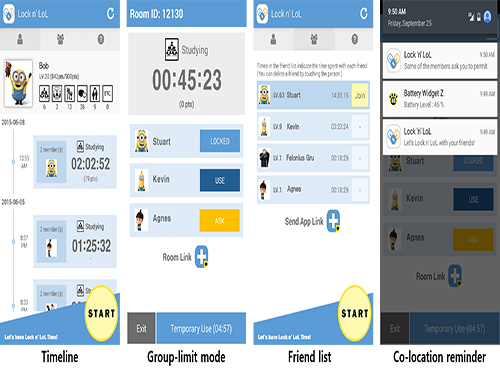 An App to Digitally Detox from Smartphone Addiction: Lock n' LOL
KAIST researchers have developed an application that helps people restrain themselves from using smartphones during meetings or social gatherings.
The app’s group limit mode enforces users to curtail their smartphone usage through peer-pressure while offering flexibility to use the phone in an emergency.
When a fake phone company released its line of products, NoPhones, a thin, rectangular-shaped plastic block that looked just like a smartphone but did not function, many doubted that the simulated smartphones would find any users. Surprisingly, close to 4,000 fake phones were sold to consumers who wanted to curb their phone usage.
As smartphones penetrate every facet of our daily lives, a growing number of people have expressed concern about distractions or even the addictions they suffer from overusing smartphones.
Professor Uichin Lee of the Department of Knowledge Service Engineering at the Korea Advanced Institute of Science and Technology (KAIST) and his research team have recently introduced a solution to this problem by developing an application, Lock n’ LoL (Lock Your Smartphone and Laugh Out Loud), to help people lock their smartphones altogether and keep them from using the phone while engaged in social activities such as meetings, conferences, and discussions.
Researchers note that the overuse of smartphones often results from users’ habitual checking of messages, emails, or other online contents such as status updates in social networking service (SNS). External stimuli, for example, notification alarms, add to smartphone distractions and interruptions in group interactions.
The Lock n’ LoL allows users to create a new room or join an existing room. The users then invite meeting participants or friends to the room and share its ID with them to enact the Group Limit (lock) mode. When phones are in the lock mode, all alarms and notifications are automatically muted, and users must ask permission to unlock their phones. However, in an emergency, users can access their phones for accumulative five minutes in a temporary unlimit mode.
In addition, the app’s Co-location Reminder detects and lists nearby users to encourage app users to limit their phone use. The Lock n’ LoL also displays important statistics to monitor users’ behavior such as the current week’s total limit time, the weekly average usage time, top friends ranked by time spent together, and top activities in which the users participated.
Professor Lee said,
“We conducted the Lock n’ LoL campaign throughout the campus for one month this year with 1,000 students participating. As a result, we discovered that students accumulated more than 10,000 free hours from using the app on their smartphones. The students said that they were able to focus more on their group activities. In an age of the Internet of Things, we expect that the adverse effects of mobile distractions and addictions will emerge as a social concern, and our Lock n’ LoL is a key effort to address this issue.”
He added, “This app will certainly help family members to interact more with each other during the holiday season.”
The Lock n’ LoL is available for free download on the App Store and Google Play: https://itunes.apple.com/lc/app/lock-n-lol/id1030287673?mt=8.
YouTube link: https://youtu.be/1wY2pI9qFYM
Figure 1: User Interfaces of Lock n’ LoL
This shows the final design of Lock n’ LoL, which consists of three tabs: My Info, Friends, and Group Limit Mode. Users can activate the limit mode by clicking the start button at the bottom of the screen.
Figure 2: Statistics of Field Deployment
This shows the deployment summary of Lock n’ LoL campaign in May 2015.
2015.12.17 View 10405
An App to Digitally Detox from Smartphone Addiction: Lock n' LOL
KAIST researchers have developed an application that helps people restrain themselves from using smartphones during meetings or social gatherings.
The app’s group limit mode enforces users to curtail their smartphone usage through peer-pressure while offering flexibility to use the phone in an emergency.
When a fake phone company released its line of products, NoPhones, a thin, rectangular-shaped plastic block that looked just like a smartphone but did not function, many doubted that the simulated smartphones would find any users. Surprisingly, close to 4,000 fake phones were sold to consumers who wanted to curb their phone usage.
As smartphones penetrate every facet of our daily lives, a growing number of people have expressed concern about distractions or even the addictions they suffer from overusing smartphones.
Professor Uichin Lee of the Department of Knowledge Service Engineering at the Korea Advanced Institute of Science and Technology (KAIST) and his research team have recently introduced a solution to this problem by developing an application, Lock n’ LoL (Lock Your Smartphone and Laugh Out Loud), to help people lock their smartphones altogether and keep them from using the phone while engaged in social activities such as meetings, conferences, and discussions.
Researchers note that the overuse of smartphones often results from users’ habitual checking of messages, emails, or other online contents such as status updates in social networking service (SNS). External stimuli, for example, notification alarms, add to smartphone distractions and interruptions in group interactions.
The Lock n’ LoL allows users to create a new room or join an existing room. The users then invite meeting participants or friends to the room and share its ID with them to enact the Group Limit (lock) mode. When phones are in the lock mode, all alarms and notifications are automatically muted, and users must ask permission to unlock their phones. However, in an emergency, users can access their phones for accumulative five minutes in a temporary unlimit mode.
In addition, the app’s Co-location Reminder detects and lists nearby users to encourage app users to limit their phone use. The Lock n’ LoL also displays important statistics to monitor users’ behavior such as the current week’s total limit time, the weekly average usage time, top friends ranked by time spent together, and top activities in which the users participated.
Professor Lee said,
“We conducted the Lock n’ LoL campaign throughout the campus for one month this year with 1,000 students participating. As a result, we discovered that students accumulated more than 10,000 free hours from using the app on their smartphones. The students said that they were able to focus more on their group activities. In an age of the Internet of Things, we expect that the adverse effects of mobile distractions and addictions will emerge as a social concern, and our Lock n’ LoL is a key effort to address this issue.”
He added, “This app will certainly help family members to interact more with each other during the holiday season.”
The Lock n’ LoL is available for free download on the App Store and Google Play: https://itunes.apple.com/lc/app/lock-n-lol/id1030287673?mt=8.
YouTube link: https://youtu.be/1wY2pI9qFYM
Figure 1: User Interfaces of Lock n’ LoL
This shows the final design of Lock n’ LoL, which consists of three tabs: My Info, Friends, and Group Limit Mode. Users can activate the limit mode by clicking the start button at the bottom of the screen.
Figure 2: Statistics of Field Deployment
This shows the deployment summary of Lock n’ LoL campaign in May 2015.
2015.12.17 View 10405 -
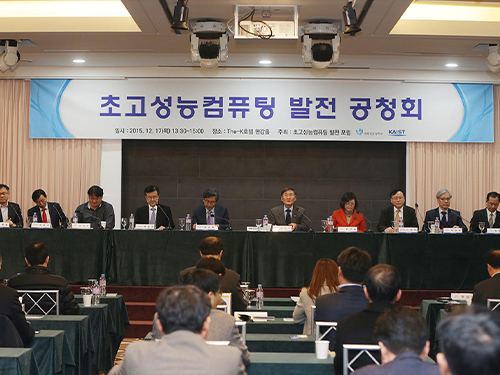 Public Forum on the Development of High-Performance Supercomputing System
KAIST hosted a public forum on the development of high-performance supercomputing systems at the K Hotel in Seoul on December 17, 2015.
About 100 participants attended the forum, including Steve Kang, the President of KAIST; Jae-Moon Park, the Director General of Science, ICT and Future Planning of the Republic of Korea; Sun-Hwa Hahn, the President of the Korea Institute of Science and Technology Information; Sang-Gyu Park, the Director of the Electronics and Telecommunications Research Institute; Soon-Chill Lee, the Dean of KAIST’s Natural Sciences College; Jangwoo Kim, the Professor of Computer Science and Engineering of Pohang University of Science and Technology; and Kyung-Hak Suh, the Director of Convergence Technology Division at the National Research Foundation of Korea.
Also attending the forum were representatives from the private sector, including Sung-Soon Park, the President of Gluesys; Myung-Chul Lee, the Director of IMB Korea; Jin-Hyun Choi, the President of Cray Korea; and Chung-Gun Yoo, the Director of HP Korea.
KAIST created the High-performance Computing Development Forum in July this year. Since then, the forum has held four conferences and workshops to discuss issues related to the growth of supercomputing power in Korea.
This public forum consisted of a keynote speech on the “Policy Proposal for the Development of Supercomputers” by Professor Hyuk-Jae Lee of the Electrical and Computer Engineering Department at Seoul National University and panel discussions presided over by President Kang on the topic of “Development and Implementation Strategies to Build Korean Supercomputers.”
President Kang said, “I hope this public forum can serve as a place for designing the future of Korean supercomputers, and what we have discussed at the forum will be duly delivered to the government to help them develop policies necessary to build the computers.”
2015.12.16 View 7586
Public Forum on the Development of High-Performance Supercomputing System
KAIST hosted a public forum on the development of high-performance supercomputing systems at the K Hotel in Seoul on December 17, 2015.
About 100 participants attended the forum, including Steve Kang, the President of KAIST; Jae-Moon Park, the Director General of Science, ICT and Future Planning of the Republic of Korea; Sun-Hwa Hahn, the President of the Korea Institute of Science and Technology Information; Sang-Gyu Park, the Director of the Electronics and Telecommunications Research Institute; Soon-Chill Lee, the Dean of KAIST’s Natural Sciences College; Jangwoo Kim, the Professor of Computer Science and Engineering of Pohang University of Science and Technology; and Kyung-Hak Suh, the Director of Convergence Technology Division at the National Research Foundation of Korea.
Also attending the forum were representatives from the private sector, including Sung-Soon Park, the President of Gluesys; Myung-Chul Lee, the Director of IMB Korea; Jin-Hyun Choi, the President of Cray Korea; and Chung-Gun Yoo, the Director of HP Korea.
KAIST created the High-performance Computing Development Forum in July this year. Since then, the forum has held four conferences and workshops to discuss issues related to the growth of supercomputing power in Korea.
This public forum consisted of a keynote speech on the “Policy Proposal for the Development of Supercomputers” by Professor Hyuk-Jae Lee of the Electrical and Computer Engineering Department at Seoul National University and panel discussions presided over by President Kang on the topic of “Development and Implementation Strategies to Build Korean Supercomputers.”
President Kang said, “I hope this public forum can serve as a place for designing the future of Korean supercomputers, and what we have discussed at the forum will be duly delivered to the government to help them develop policies necessary to build the computers.”
2015.12.16 View 7586 -
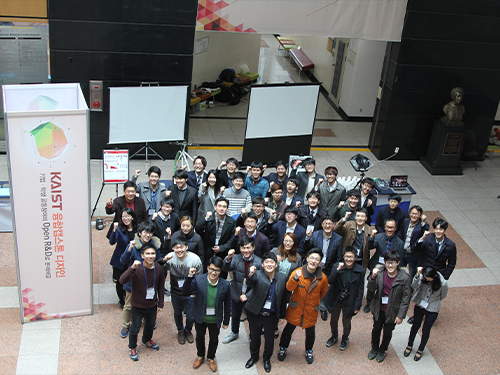 The Final Presentation of the 2015 Interdisciplinary Convergence Capstone Design Takes Place on Campus
The final presentation of the 2015 Interdisciplinary Convergence Capstone Design took place in the lobby of the Creative Lecture Hall on December 11, 2015.
Started in the spring of 2014, the capstone design course offers KAIST’s undergraduate students an opportunity to explore solutions, based on their learning from coursework, to real and important industry and engineering problems.
In the class, five students with different majors form a team to discuss and identify what are the problems of a certain company’s products, the causes, and possible design solutions for such problems. After reaching a conclusion, students then manufacture a prototype to address the problems.
In this presentation, six teams introduced their research topic and subsequently, demonstrated their trial products.
Sung-Hyun Cho, a student majoring in Mechanical Engineering, presented the “Designing a Robot System for Automatic Collection of Radio Maps,” and Jong-Yong Do, also majoring in Mechanical Engineering, showcased his “Sleeping Pattern Measurement Pad.” Topics such as noise measurement, haptic handles, wrinkle improvements by micro-needling, and fingerprint scanners were also discussed.
Students who developed these techniques have already finished patent applications, and interested companies are planning to commercialize the techniques after evaluating their marketability.
Recently, there were concerns in Korea that engineering students were overly interested in the publication of research papers due to the paper-based evaluation of research outcomes. In response, KAIST has emphasized a more field-centered education to help students gain insightful perspective to real issues in science and engineering.
Wan-Su Kim, a student in the Mechanical Engineering Department said that “this course provided me with an invaluable experience to apply engineering principles that I’ve learned from class to the actual field, while sharing ideas and solutions with other students.”
Professors Su-Kyung Park and Ik-Jin Lee of the Department of Mechanical Engineering, Professor Seok-Hyung Bae of the Department of Industrial Design, Professor Yu-Chun Kim of the Department of Biological Sciences, Professor Dong-Su Han of the School of Computing, and Professor Jun-Bo Youn of the School of Electrical Engineering participated in the course as advisers.
2015.12.11 View 7228
The Final Presentation of the 2015 Interdisciplinary Convergence Capstone Design Takes Place on Campus
The final presentation of the 2015 Interdisciplinary Convergence Capstone Design took place in the lobby of the Creative Lecture Hall on December 11, 2015.
Started in the spring of 2014, the capstone design course offers KAIST’s undergraduate students an opportunity to explore solutions, based on their learning from coursework, to real and important industry and engineering problems.
In the class, five students with different majors form a team to discuss and identify what are the problems of a certain company’s products, the causes, and possible design solutions for such problems. After reaching a conclusion, students then manufacture a prototype to address the problems.
In this presentation, six teams introduced their research topic and subsequently, demonstrated their trial products.
Sung-Hyun Cho, a student majoring in Mechanical Engineering, presented the “Designing a Robot System for Automatic Collection of Radio Maps,” and Jong-Yong Do, also majoring in Mechanical Engineering, showcased his “Sleeping Pattern Measurement Pad.” Topics such as noise measurement, haptic handles, wrinkle improvements by micro-needling, and fingerprint scanners were also discussed.
Students who developed these techniques have already finished patent applications, and interested companies are planning to commercialize the techniques after evaluating their marketability.
Recently, there were concerns in Korea that engineering students were overly interested in the publication of research papers due to the paper-based evaluation of research outcomes. In response, KAIST has emphasized a more field-centered education to help students gain insightful perspective to real issues in science and engineering.
Wan-Su Kim, a student in the Mechanical Engineering Department said that “this course provided me with an invaluable experience to apply engineering principles that I’ve learned from class to the actual field, while sharing ideas and solutions with other students.”
Professors Su-Kyung Park and Ik-Jin Lee of the Department of Mechanical Engineering, Professor Seok-Hyung Bae of the Department of Industrial Design, Professor Yu-Chun Kim of the Department of Biological Sciences, Professor Dong-Su Han of the School of Computing, and Professor Jun-Bo Youn of the School of Electrical Engineering participated in the course as advisers.
2015.12.11 View 7228 -
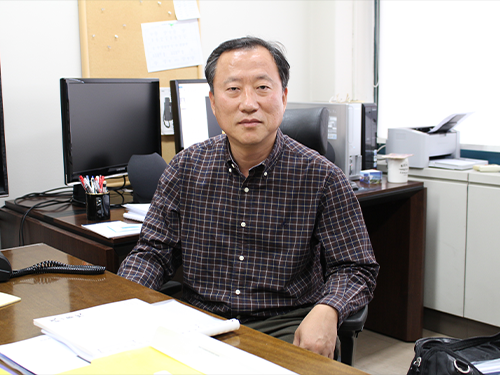 Professor Tae-Eog Lee Receives December's Scientist of the Month Award by the Korean Government
Professor Tae-Eog Lee of the Industrial and Systems Engineering at KAIST received the Scientist of the Month Award for December 2015. The award is sponsored by the Ministry of Science, ICT and Future Planning of Korea, which was hosted by the National Research Foundation of Korea.
The award recognizes Professor Lee’s efforts to advance the field of semiconductor device fabrication processing. This includes the development of the most efficient scheduling and controlling of cluster tools. He also created mathematical solutions to optimize the complicated cycle time of cluster tools in semiconductor manufacturing and the process of robot task workload.
Professor Lee contributed to the formation of various discrete event systems and automation systems based on his mathematical theories and solutions and advanced a scheduling technology for the automation of semiconductor production.
He has published 18 research papers in the past three years and has pioneered to develop Korean tool schedulers through the private sector-university cooperation.
2015.12.10 View 7707
Professor Tae-Eog Lee Receives December's Scientist of the Month Award by the Korean Government
Professor Tae-Eog Lee of the Industrial and Systems Engineering at KAIST received the Scientist of the Month Award for December 2015. The award is sponsored by the Ministry of Science, ICT and Future Planning of Korea, which was hosted by the National Research Foundation of Korea.
The award recognizes Professor Lee’s efforts to advance the field of semiconductor device fabrication processing. This includes the development of the most efficient scheduling and controlling of cluster tools. He also created mathematical solutions to optimize the complicated cycle time of cluster tools in semiconductor manufacturing and the process of robot task workload.
Professor Lee contributed to the formation of various discrete event systems and automation systems based on his mathematical theories and solutions and advanced a scheduling technology for the automation of semiconductor production.
He has published 18 research papers in the past three years and has pioneered to develop Korean tool schedulers through the private sector-university cooperation.
2015.12.10 View 7707 -
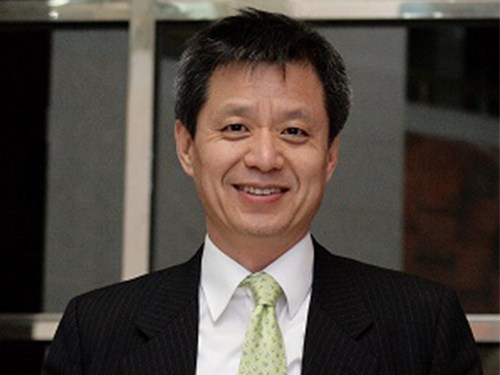 Professor Duck-Joo Lee Receives the Achievement Award in the Asian-Australian Rotorcraft Forum 2015
Professor Duck-Joo Lee of the Aerospace Engineering Department at KAIST received the achievement award in ARF (Asian-Australian Rotorcraft Forum) 2015. In ARF, companies such as Bell Helicopter and Airbus Helicopter gather and share their technological discoveries.
Professor Lee was elected as Chairman of the first ARF to oversee the organization of its forum as well as exhibitions, and his effort towards advancing rotorcraft was recognized.
Professor Lee said, “I hope that research findings of many scholars will be applied to the domestic air transportation businesses.” He added, “More companies in the field should enter the global market.”
Professor Lee started his career as a researcher in NASA Ames Research Center. He is an expert in the fields of jet engines and aeroacoustics.
2015.12.08 View 7070
Professor Duck-Joo Lee Receives the Achievement Award in the Asian-Australian Rotorcraft Forum 2015
Professor Duck-Joo Lee of the Aerospace Engineering Department at KAIST received the achievement award in ARF (Asian-Australian Rotorcraft Forum) 2015. In ARF, companies such as Bell Helicopter and Airbus Helicopter gather and share their technological discoveries.
Professor Lee was elected as Chairman of the first ARF to oversee the organization of its forum as well as exhibitions, and his effort towards advancing rotorcraft was recognized.
Professor Lee said, “I hope that research findings of many scholars will be applied to the domestic air transportation businesses.” He added, “More companies in the field should enter the global market.”
Professor Lee started his career as a researcher in NASA Ames Research Center. He is an expert in the fields of jet engines and aeroacoustics.
2015.12.08 View 7070 -
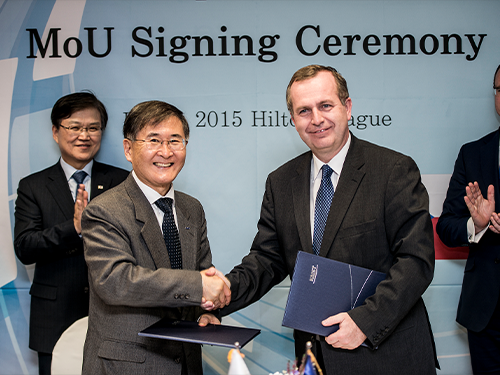 KAIST and Charles University Agree to Cooperate
KAIST and Charles University in Prague, the Czech Republic, agreed to cooperate in research and education.
President Steve Kang of KAIST (pictured on the left) and Rector Tomáš Zima of Charles University signed the agreement on December 2, 2015, at the Hilton Hotel in Prague.
Minster Yang-Hee Choi of Science, ICT and Future Planning of the Republic of Korea and Minister Kateřina Valachová of Education, Youth and Sports of the Czech Republic also joined the signing ceremony.
Under the agreement, the two institutions will exchange students and researchers, as well as implement joint research programs.
President Kang said, “We are pleased to work with one of the most prestigious universities in the Czech Republic and hope to build a good partnership in the years ahead.”
Founded in 1348, Charles University in Prague is the oldest and largest university in the Czech Republic. The university received two Nobel prizes in physiology or medicine and in chemistry in 1947 and 1959, respectively.
2015.12.03 View 7865
KAIST and Charles University Agree to Cooperate
KAIST and Charles University in Prague, the Czech Republic, agreed to cooperate in research and education.
President Steve Kang of KAIST (pictured on the left) and Rector Tomáš Zima of Charles University signed the agreement on December 2, 2015, at the Hilton Hotel in Prague.
Minster Yang-Hee Choi of Science, ICT and Future Planning of the Republic of Korea and Minister Kateřina Valachová of Education, Youth and Sports of the Czech Republic also joined the signing ceremony.
Under the agreement, the two institutions will exchange students and researchers, as well as implement joint research programs.
President Kang said, “We are pleased to work with one of the most prestigious universities in the Czech Republic and hope to build a good partnership in the years ahead.”
Founded in 1348, Charles University in Prague is the oldest and largest university in the Czech Republic. The university received two Nobel prizes in physiology or medicine and in chemistry in 1947 and 1959, respectively.
2015.12.03 View 7865 -
 KAIST Holds Its Fourth Public Art Exhibition
KAIST hosted an opening ceremony for the annual art exhibition on December 3, 2015 at the KAIST Institute building. The KAIST Art and Design Committee first organized the event in 2012 to promote the integration of art and technology.
This year’s event entitled “Understanding the Purpose of an Object” will display 20 art pieces under six themes. Artist Keumhong Lee, Haeyool Roh, Joon Kim, Kyung Lee, and Juhae Yang participated in the exhibition. The names of some of the art pieces include “Feedback Field” by Joon Kim, “Self Action” by Haeyool Roh, and “Net of Time” by Juhae Yang.
Juhae Yang believes that, in the digital age, an identity of an object is defined by the traces of light which we read in the information hidden in the barcodes. Based on this interpretation, she transforms the black bars and white spaces into a harmony of colors and sounds. The continuum of colors and sounds in her work arouses time-space synesthesia.
Professor Sangmin Bae of the Industrial Design Department, the Director of the KAIST Art and Design Committee, hopes that the exhibition will inspire novel scientific ideas and artistic spirits.
The exhibition will remain open to the public until December 20, 2015.
2015.12.03 View 8730
KAIST Holds Its Fourth Public Art Exhibition
KAIST hosted an opening ceremony for the annual art exhibition on December 3, 2015 at the KAIST Institute building. The KAIST Art and Design Committee first organized the event in 2012 to promote the integration of art and technology.
This year’s event entitled “Understanding the Purpose of an Object” will display 20 art pieces under six themes. Artist Keumhong Lee, Haeyool Roh, Joon Kim, Kyung Lee, and Juhae Yang participated in the exhibition. The names of some of the art pieces include “Feedback Field” by Joon Kim, “Self Action” by Haeyool Roh, and “Net of Time” by Juhae Yang.
Juhae Yang believes that, in the digital age, an identity of an object is defined by the traces of light which we read in the information hidden in the barcodes. Based on this interpretation, she transforms the black bars and white spaces into a harmony of colors and sounds. The continuum of colors and sounds in her work arouses time-space synesthesia.
Professor Sangmin Bae of the Industrial Design Department, the Director of the KAIST Art and Design Committee, hopes that the exhibition will inspire novel scientific ideas and artistic spirits.
The exhibition will remain open to the public until December 20, 2015.
2015.12.03 View 8730 -
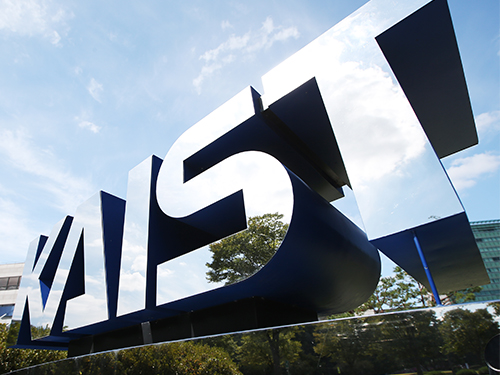 KAIST's Top 10 Contributions to Korea and the World
Established in 1971, the Korea Advanced Institute of Science and Technology (KAIST) started off as a relatively modest graduate school in a few disciplines in science and technology, but has gradually expanded into a full-fledged research university over the years.
From the beginning, KAIST was intended to offer an elite science education, setting it apart from other universities in Korea. A majority of its graduates have contributed to the development of, what the world now praises, Korean industry and economy, and have led the Korean scientific community for several decades. The university has also advanced the frontiers of knowledge, conducting the lion’s share of the nation’s private research and development in basic and applied science, leading to innovations and technologies essential to the growth of today’s Korea.
As it establishes international benchmarks of success, KAIST has acquired a global reputation for delivering the highest level of science and engineering education, while performing cutting-edge research and serving as a crucial driver to generate new knowledge and innovation beneficial not only to Korea but also to the world. The university has consistently ranked in the top 100 research universities for over more than a decade, according to the world university rankings published by international ranking institutions for higher education, among others, Quacquarelli Symonds and the Times Higher Education.
KAIST will mark its 45th anniversary next year. It plans to celebrate the anniversary, and here are some of the reasons why:
KAIST’s Win at the DARPA Robotics Challenge (DRC) 2015
Team KAIST, consisted of 29 members (students and researchers) led by Professors Jun-Ho Oh of the Mechanical Engineering Department and In-So Kweon of the Electrical Engineering Department, won the international humanoid robotics competition hosted by the United States (US) Defense Advanced Research Projects Agency (DARPA). Upon completion of the first and second competitions, the finals were held on June 5-6, 2015, at the Fairplex in Pomona, California. DARPA hosted the event to spur the development of humanoid robots to assist rescue and relief efforts in dangerous environments such as the Fukushima Daiichi nuclear incident in 2011. With 24 international teams participating in the finals from the US, Japan, Germany, China, Italy, and Korea, Team KAIST’s humanoid robot, DRC-HUBO, completed all eight tasks in 44 minutes and 28 seconds, six minutes earlier than the runner-up, and almost eleven minutes earlier than the third-place team, walking away with the grand prize of USD 2 million.
Hitting a Grand Slam to Win Major International Design Awards
Professor Sang-Min Bae of the Industrial Design Department achieved a grand slam in international design awards with his work HEARTea, an interactive tumbler, winning four major design competitions in the world: the iF Design Award, the International Design Excellence Awards, the Red Dot Design Award, and the Good Design Award. Released in 2010, HEARTea swept prizes from the four awards which were held during the period of the year 2010-2011. The tumbler displays the temperature of liquid contained inside in three degrees (cool, warm, and hot) by showing different colored lights on the surface of the tumbler based on the liquid temperature (see picture below). In 2015, Professor Bae and his research team won three awards from the 2015 Red Dot Design Award: the Best of the Best Award and two Red Dot Design Concept Awards. The team received the Best of the Best Award, the most prestigious award among the Red Dot Design awards, for Boxchool, a modular classroom built on shipping containers, which offers underprivileged children better opportunities for learning. With greater mobility, Boxchool can be easily installed in any setting, including remote areas where children do not have access to regular school facilities.
Glass Fabric Thermoelectric Generator, the Grand Prize Winner at the Netexplo Forum 2015
Professor Byung-Jin Cho of the Electrical Engineering Department received the grand prize at the Netexplo Forum 2015 held in partnership with the United Nations Educational, Scientific, and Cultural Organization (UNESCO) on February 4-5, 2015, at the UNESCO House in Paris. Established in 2007, the Netexplo Forum is an annual international conference hosted by the Netexplo Observatory, a non-profit organization sponsored by the French Senate and the French Ministry for the Digital Economy, which studies the impact of digital technology on society and business. Each year, the Netexplo Forum highlights major trends in digital technology and innovation worldwide and lists the top ten most promising technologies that it considers will greatly impact the world. Among the list for this year, Professor Cho’s glass fabric-based thermoelectric (TE) generator received the grand prize. Using a screen-printing technique, Professor Cho printed TE liquid materials onto a glass fabric to generate electricity through the thermoelectric effect, that is, by generating electricity from temperature difference. Since the glass fabric is light and flexible, this technology is expected to have a wide range of applications in wearable computers and devices.
Charging on the Go: Online Electric Vehicle System
KAIST’s Online Electric Vehicle (OLEV) is a system that charges electric vehicles while stationary or driving, thus removing the need to stop for charges. Developed by Professor Dong-Ho Cho of the Electrical Engineering Department and his research team, OLEV receives power wirelessly through a new application called “Shaped Magnetic Field in Resonance technology (SMFIR).” Electrical cables buried underneath roads create magnetic fields, and a receiving device installed underneath the electric vehicle collects the fields and converts them into electricity. Time, a US weekly magazine, listed OLEV as one of the 50 Greatest Inventions of the Year 2010 in its November 22nd issue. Since 2012, several OLEV buses have been operating daily to provide citizens with transportation in cities such as Yeosu, Gumi, and Sejong in Korea. In April 2015, Professor Cho signed a memorandum of understanding with the city government of Medellín, the second largest city in Colombia, to provide two OLEV buses for inner-city transportation services. The research team also developed OLEV for a high capacity transit system including trams and high-speed trains, successfully showcasing 60 kHz of power transferred wirelessly to trams and trains in 2013 and 2014, respectively.
Pioneer in the Development of Functional Mesoporous Materials and Zeolites
On September 25, 2014, Thomson Reuters announced the “2014 Citation Laureates,” a list of candidates considered likely to win the Nobel Prize in the fields of physics, chemistry, physiology or medicine, and economics. Distinguished Professor Ryong Ryoo of the Department of Chemistry was named the 2014 Thomson Reuters Citation Laureates in Chemistry in recognition of his significant contribution to the advancement of designing functional mesoporous materials. He is the first Korean scientist to make the list. Professor Ryoo has pioneered the field of functional mesoporous materials and zeolites which are widely used as catalysts and sorbents. In 1999, he developed a nanocasting method, and with the technique, was able to synthesize ordered mesoporous carbon materials, for the first time in the world. Today, ordered mesoporous carbon materials have widespread applications in many areas such as adsorbents, catalysts and supports, gas-storage hosts, and electrode materials. Since 2006, using zeolite frameworks, Professor Ryoo has led the development of new methods to synthesize mesoporous materials whose molecules are designed to have a hierarchical structure of microspores and mesopores. He has published 255 research papers in renowned academic journals including Nature and Science. In December 2011, Science highlighted his research as one of the top ten breakthroughs in the year of 2011 in an article entitled “Directing Zeolite Structures into Hierarchically Nanoporous Architectures.” Professor Ryoo received numerous awards and honors including the World’s Top 100 Chemists over the Past 11 Years (2000-2010) by UNESCO and IUPAC (International Union of Pure and Applied Chemistry), the Breck Award by International Zeolite Association, and the Ho-Am prize in Science.
The Launch of Korea’s First Satellites into Space
Founded in 1989, the Satellite Technology Research Center (SaTReC) at KAIST has led the development of a series of Korean-made satellites over the past 26 years. The first satellite, the Korea Institute of Technology Satellite-1 (KITSAT-1), was launched on August 11, 1992, at the Guiana Space Center in Kourou, French Guiana. KITSAT-1 was designed in collaboration with a British university, the University of Surrey in Guildford. The success of KITSAT-1 sparked nation-wide interest in the development of space technology and led to the subsequent launches of 18 satellites and three carrier rockets such as KITSAT-2 and 3 (meteorological satellites); KSR-1, 2, and 3 (carrier rockets); KOREASAT-1, 2, 3, 5, and 6 (communication satellites); KOMPSAT-1, 2, 3, and 5 (multipurpose satellites); STSAT-1, 2C, and 3 (scientific satellites); and COMS-1 (navigation satellite). The latest scientific satellite, STSAT-3, and an earth observation satellite, KOMPSAT-3A, were launched in 2013 and 2015, respectively. The STSAT-2C, exclusively developed by SaTReC, was launched in January 2013 and transmitted data on the observation of space environments to the ground station located on KAIST’s campus for 14 months. The STSAT-2C was the first satellite developed solely with Korean technology. On June 30, 2009, the Korean government also established a spaceport in South Jeolla’s Goheung County, the Naro Space Center to launch satellites and spacecraft.
KAIST: Major Feeder for Startups in Korea
As seen in its core values of promoting creativity and a challenging spirit, KAIST has always encouraged startups and technology transfers led by university members including students and faculty. In the past four years from 2011 to 2014, students and faculty members have created 104 startups based on technology innovation and research outcomes, with an average of 26 new companies started per year. This is the highest number of university-led startups in Korea. As of 2013, KAIST graduates founded a total of 1,245 companies, generating approximately USD 1.5 billion sales and creating 34,000 jobs. KAIST has provided a variety of programs and facilities to build a startup-friendly campus culture and support student- and faculty-led entrepreneurship, for example, the End-Run Policy, Startup KAIST Studio, the Institute of Startup and Entrepreneurship, and the Startup Incubation Center. In particular, KAIST Idea Factory, a startup laboratory established last year, where students play around with ideas by conducting new experiments or building test products, created 3-D printers this year, producing 20 prototypes and filing four pending patents. Recently, KAIST has registered four proprietary standard patents with MPEG (Moving Picture Experts Group)-LA’s HEVC (High Efficiency Video Coding) Patent Portfolio License, which provides access to essential patent rights for the HEVC digital video coding standard. KAIST expects to acquire more than 50 proprietary standard patents within two years, generating close to UDS 1 million in income.
The Number of KAIST Doctoral Graduates Reaches Over 10,000
Since the establishment of KAIST forty-four years ago, more than ten thousand alumni have received their doctorates. The university’s 2015 Commencement ceremony took place on February 13, 2015, at the Sports Complex on campus, awarding Dr. Sun-Mi Cho of the Department of Biological Sciences the 10,000th doctoral degree. She also received her Bachelor’s and Master’s degrees from KAIST. In 1978, KAIST had only two doctoral graduates, but since 1987, there have been more than one hundred graduates each year, two hundred since 1994, and four hundred since 2000. In 2015 alone, 522 doctoral students graduated. One of the first doctoral graduates, Dr. Dong-Yol Yang (Class of 1978 in the Mechanical Engineering Department) became a professor in the same department of KAIST. In the early 1970s, many Koreans preferred to go abroad for Ph.D. degrees, but this changed when KAIST began to select candidates for master’s degrees in 1973, and doctoral degrees in 1975. Talented Korean students began to work in KAIST laboratories, and its graduates were known for their knowledge and skills. Now, KAIST receives many applications from talented foreign students as well. At the 2015 Commencement, KAIST conferred 522 Doctoral, 1,241 Master’s, and 915 Bachelor of Science degrees. Since its inception in 1971, KAIST has granted 10,403 doctoral degrees, 26,402 master’s degrees, and 51,412 bachelor’s degrees.
Fostering a New Learning Model: The Education 3.0 Program
KAIST undertook a bold initiative to improve its education system that would address more effectively the needs of today’s higher education to foster talents with creative and critical thinking skills. It introduced a new pedagogical model, the Education 3.0 program, to the campus in the spring of 2012, which was then an extremely rare movement taken by universities around the world. The Education 3.0 program incorporates flipped learning and smart classrooms. This means there are no formal lectures while in-class time is devoted to problem solving, exercises, projects, or discussions. The program provided students with greater opportunity to control their learning and interact more with professors and peers. Originally started with three general courses in physics, chemistry, and biology, the Education 3.0 is now offered in 50-60 courses per semester. In 2013 alone, approximately 2,000 KAIST students took the Education 3.0 courses. The university has also developed and implemented an e-Learning system to provide online courses, as well as participated in the Massive Open Online Course (MOOC). Partnering with Coursera since 2013, KAIST has offered three MOOCs in engineering and business management to the global community. Leading the efforts to create Korean MOOCs (K-MOOCs), KAIST agreed with other Korean universities in October 2015 to create online courses in basic subjects of physics, chemistry, mathematics, life science, mechanical engineering, and material science. K-MOOCs will be available in the summer of 2016.
Holistic Admissions for Undergraduates
Korean universities traditionally put an emphasis on students’ empirical data such as a GPA or the national College Scholastic Ability Test (CSAT) when reviewing applicants for the undergraduate admission. This practice, however, has posed serious challenges, most notably with CSAT’s requirement that the test takes place only once a year. It was simply impossible and unfair to assess students’ capability from the scores of a high-pressure, high-stakes standardized test. In 2009, KAIST changed its undergraduate admission process to consider the whole applicant’s profile, not just looking for students with good grades, but interesting and promising students who would contribute to the campus community in different and diverse ways. KAIST’s admissions officers have taken into account applicants’ interests, passions, special talents, and personality through their personal essays, recommendation letters, extracurricular activities, and intensive interviews. Prior to KAIST’s new policy, no other university in the nation had ever incorporated such a holistic approach to review student applications. Today, most Korean universities have adopted this admission policy. In addition, for the first time in Korea, KAIST offered all freshmen the option to defer the decision on majors, thereby allowing them to explore their interests more freely. Even after declaring majors as sophomores and higher classes, KAIST students can easily change their majors, and undergraduate students can actually create and lead their own research projects. As such, KAIST has continued to offer innovations to provide students with a quality education to foster their potential.
2015.11.27 View 18051
KAIST's Top 10 Contributions to Korea and the World
Established in 1971, the Korea Advanced Institute of Science and Technology (KAIST) started off as a relatively modest graduate school in a few disciplines in science and technology, but has gradually expanded into a full-fledged research university over the years.
From the beginning, KAIST was intended to offer an elite science education, setting it apart from other universities in Korea. A majority of its graduates have contributed to the development of, what the world now praises, Korean industry and economy, and have led the Korean scientific community for several decades. The university has also advanced the frontiers of knowledge, conducting the lion’s share of the nation’s private research and development in basic and applied science, leading to innovations and technologies essential to the growth of today’s Korea.
As it establishes international benchmarks of success, KAIST has acquired a global reputation for delivering the highest level of science and engineering education, while performing cutting-edge research and serving as a crucial driver to generate new knowledge and innovation beneficial not only to Korea but also to the world. The university has consistently ranked in the top 100 research universities for over more than a decade, according to the world university rankings published by international ranking institutions for higher education, among others, Quacquarelli Symonds and the Times Higher Education.
KAIST will mark its 45th anniversary next year. It plans to celebrate the anniversary, and here are some of the reasons why:
KAIST’s Win at the DARPA Robotics Challenge (DRC) 2015
Team KAIST, consisted of 29 members (students and researchers) led by Professors Jun-Ho Oh of the Mechanical Engineering Department and In-So Kweon of the Electrical Engineering Department, won the international humanoid robotics competition hosted by the United States (US) Defense Advanced Research Projects Agency (DARPA). Upon completion of the first and second competitions, the finals were held on June 5-6, 2015, at the Fairplex in Pomona, California. DARPA hosted the event to spur the development of humanoid robots to assist rescue and relief efforts in dangerous environments such as the Fukushima Daiichi nuclear incident in 2011. With 24 international teams participating in the finals from the US, Japan, Germany, China, Italy, and Korea, Team KAIST’s humanoid robot, DRC-HUBO, completed all eight tasks in 44 minutes and 28 seconds, six minutes earlier than the runner-up, and almost eleven minutes earlier than the third-place team, walking away with the grand prize of USD 2 million.
Hitting a Grand Slam to Win Major International Design Awards
Professor Sang-Min Bae of the Industrial Design Department achieved a grand slam in international design awards with his work HEARTea, an interactive tumbler, winning four major design competitions in the world: the iF Design Award, the International Design Excellence Awards, the Red Dot Design Award, and the Good Design Award. Released in 2010, HEARTea swept prizes from the four awards which were held during the period of the year 2010-2011. The tumbler displays the temperature of liquid contained inside in three degrees (cool, warm, and hot) by showing different colored lights on the surface of the tumbler based on the liquid temperature (see picture below). In 2015, Professor Bae and his research team won three awards from the 2015 Red Dot Design Award: the Best of the Best Award and two Red Dot Design Concept Awards. The team received the Best of the Best Award, the most prestigious award among the Red Dot Design awards, for Boxchool, a modular classroom built on shipping containers, which offers underprivileged children better opportunities for learning. With greater mobility, Boxchool can be easily installed in any setting, including remote areas where children do not have access to regular school facilities.
Glass Fabric Thermoelectric Generator, the Grand Prize Winner at the Netexplo Forum 2015
Professor Byung-Jin Cho of the Electrical Engineering Department received the grand prize at the Netexplo Forum 2015 held in partnership with the United Nations Educational, Scientific, and Cultural Organization (UNESCO) on February 4-5, 2015, at the UNESCO House in Paris. Established in 2007, the Netexplo Forum is an annual international conference hosted by the Netexplo Observatory, a non-profit organization sponsored by the French Senate and the French Ministry for the Digital Economy, which studies the impact of digital technology on society and business. Each year, the Netexplo Forum highlights major trends in digital technology and innovation worldwide and lists the top ten most promising technologies that it considers will greatly impact the world. Among the list for this year, Professor Cho’s glass fabric-based thermoelectric (TE) generator received the grand prize. Using a screen-printing technique, Professor Cho printed TE liquid materials onto a glass fabric to generate electricity through the thermoelectric effect, that is, by generating electricity from temperature difference. Since the glass fabric is light and flexible, this technology is expected to have a wide range of applications in wearable computers and devices.
Charging on the Go: Online Electric Vehicle System
KAIST’s Online Electric Vehicle (OLEV) is a system that charges electric vehicles while stationary or driving, thus removing the need to stop for charges. Developed by Professor Dong-Ho Cho of the Electrical Engineering Department and his research team, OLEV receives power wirelessly through a new application called “Shaped Magnetic Field in Resonance technology (SMFIR).” Electrical cables buried underneath roads create magnetic fields, and a receiving device installed underneath the electric vehicle collects the fields and converts them into electricity. Time, a US weekly magazine, listed OLEV as one of the 50 Greatest Inventions of the Year 2010 in its November 22nd issue. Since 2012, several OLEV buses have been operating daily to provide citizens with transportation in cities such as Yeosu, Gumi, and Sejong in Korea. In April 2015, Professor Cho signed a memorandum of understanding with the city government of Medellín, the second largest city in Colombia, to provide two OLEV buses for inner-city transportation services. The research team also developed OLEV for a high capacity transit system including trams and high-speed trains, successfully showcasing 60 kHz of power transferred wirelessly to trams and trains in 2013 and 2014, respectively.
Pioneer in the Development of Functional Mesoporous Materials and Zeolites
On September 25, 2014, Thomson Reuters announced the “2014 Citation Laureates,” a list of candidates considered likely to win the Nobel Prize in the fields of physics, chemistry, physiology or medicine, and economics. Distinguished Professor Ryong Ryoo of the Department of Chemistry was named the 2014 Thomson Reuters Citation Laureates in Chemistry in recognition of his significant contribution to the advancement of designing functional mesoporous materials. He is the first Korean scientist to make the list. Professor Ryoo has pioneered the field of functional mesoporous materials and zeolites which are widely used as catalysts and sorbents. In 1999, he developed a nanocasting method, and with the technique, was able to synthesize ordered mesoporous carbon materials, for the first time in the world. Today, ordered mesoporous carbon materials have widespread applications in many areas such as adsorbents, catalysts and supports, gas-storage hosts, and electrode materials. Since 2006, using zeolite frameworks, Professor Ryoo has led the development of new methods to synthesize mesoporous materials whose molecules are designed to have a hierarchical structure of microspores and mesopores. He has published 255 research papers in renowned academic journals including Nature and Science. In December 2011, Science highlighted his research as one of the top ten breakthroughs in the year of 2011 in an article entitled “Directing Zeolite Structures into Hierarchically Nanoporous Architectures.” Professor Ryoo received numerous awards and honors including the World’s Top 100 Chemists over the Past 11 Years (2000-2010) by UNESCO and IUPAC (International Union of Pure and Applied Chemistry), the Breck Award by International Zeolite Association, and the Ho-Am prize in Science.
The Launch of Korea’s First Satellites into Space
Founded in 1989, the Satellite Technology Research Center (SaTReC) at KAIST has led the development of a series of Korean-made satellites over the past 26 years. The first satellite, the Korea Institute of Technology Satellite-1 (KITSAT-1), was launched on August 11, 1992, at the Guiana Space Center in Kourou, French Guiana. KITSAT-1 was designed in collaboration with a British university, the University of Surrey in Guildford. The success of KITSAT-1 sparked nation-wide interest in the development of space technology and led to the subsequent launches of 18 satellites and three carrier rockets such as KITSAT-2 and 3 (meteorological satellites); KSR-1, 2, and 3 (carrier rockets); KOREASAT-1, 2, 3, 5, and 6 (communication satellites); KOMPSAT-1, 2, 3, and 5 (multipurpose satellites); STSAT-1, 2C, and 3 (scientific satellites); and COMS-1 (navigation satellite). The latest scientific satellite, STSAT-3, and an earth observation satellite, KOMPSAT-3A, were launched in 2013 and 2015, respectively. The STSAT-2C, exclusively developed by SaTReC, was launched in January 2013 and transmitted data on the observation of space environments to the ground station located on KAIST’s campus for 14 months. The STSAT-2C was the first satellite developed solely with Korean technology. On June 30, 2009, the Korean government also established a spaceport in South Jeolla’s Goheung County, the Naro Space Center to launch satellites and spacecraft.
KAIST: Major Feeder for Startups in Korea
As seen in its core values of promoting creativity and a challenging spirit, KAIST has always encouraged startups and technology transfers led by university members including students and faculty. In the past four years from 2011 to 2014, students and faculty members have created 104 startups based on technology innovation and research outcomes, with an average of 26 new companies started per year. This is the highest number of university-led startups in Korea. As of 2013, KAIST graduates founded a total of 1,245 companies, generating approximately USD 1.5 billion sales and creating 34,000 jobs. KAIST has provided a variety of programs and facilities to build a startup-friendly campus culture and support student- and faculty-led entrepreneurship, for example, the End-Run Policy, Startup KAIST Studio, the Institute of Startup and Entrepreneurship, and the Startup Incubation Center. In particular, KAIST Idea Factory, a startup laboratory established last year, where students play around with ideas by conducting new experiments or building test products, created 3-D printers this year, producing 20 prototypes and filing four pending patents. Recently, KAIST has registered four proprietary standard patents with MPEG (Moving Picture Experts Group)-LA’s HEVC (High Efficiency Video Coding) Patent Portfolio License, which provides access to essential patent rights for the HEVC digital video coding standard. KAIST expects to acquire more than 50 proprietary standard patents within two years, generating close to UDS 1 million in income.
The Number of KAIST Doctoral Graduates Reaches Over 10,000
Since the establishment of KAIST forty-four years ago, more than ten thousand alumni have received their doctorates. The university’s 2015 Commencement ceremony took place on February 13, 2015, at the Sports Complex on campus, awarding Dr. Sun-Mi Cho of the Department of Biological Sciences the 10,000th doctoral degree. She also received her Bachelor’s and Master’s degrees from KAIST. In 1978, KAIST had only two doctoral graduates, but since 1987, there have been more than one hundred graduates each year, two hundred since 1994, and four hundred since 2000. In 2015 alone, 522 doctoral students graduated. One of the first doctoral graduates, Dr. Dong-Yol Yang (Class of 1978 in the Mechanical Engineering Department) became a professor in the same department of KAIST. In the early 1970s, many Koreans preferred to go abroad for Ph.D. degrees, but this changed when KAIST began to select candidates for master’s degrees in 1973, and doctoral degrees in 1975. Talented Korean students began to work in KAIST laboratories, and its graduates were known for their knowledge and skills. Now, KAIST receives many applications from talented foreign students as well. At the 2015 Commencement, KAIST conferred 522 Doctoral, 1,241 Master’s, and 915 Bachelor of Science degrees. Since its inception in 1971, KAIST has granted 10,403 doctoral degrees, 26,402 master’s degrees, and 51,412 bachelor’s degrees.
Fostering a New Learning Model: The Education 3.0 Program
KAIST undertook a bold initiative to improve its education system that would address more effectively the needs of today’s higher education to foster talents with creative and critical thinking skills. It introduced a new pedagogical model, the Education 3.0 program, to the campus in the spring of 2012, which was then an extremely rare movement taken by universities around the world. The Education 3.0 program incorporates flipped learning and smart classrooms. This means there are no formal lectures while in-class time is devoted to problem solving, exercises, projects, or discussions. The program provided students with greater opportunity to control their learning and interact more with professors and peers. Originally started with three general courses in physics, chemistry, and biology, the Education 3.0 is now offered in 50-60 courses per semester. In 2013 alone, approximately 2,000 KAIST students took the Education 3.0 courses. The university has also developed and implemented an e-Learning system to provide online courses, as well as participated in the Massive Open Online Course (MOOC). Partnering with Coursera since 2013, KAIST has offered three MOOCs in engineering and business management to the global community. Leading the efforts to create Korean MOOCs (K-MOOCs), KAIST agreed with other Korean universities in October 2015 to create online courses in basic subjects of physics, chemistry, mathematics, life science, mechanical engineering, and material science. K-MOOCs will be available in the summer of 2016.
Holistic Admissions for Undergraduates
Korean universities traditionally put an emphasis on students’ empirical data such as a GPA or the national College Scholastic Ability Test (CSAT) when reviewing applicants for the undergraduate admission. This practice, however, has posed serious challenges, most notably with CSAT’s requirement that the test takes place only once a year. It was simply impossible and unfair to assess students’ capability from the scores of a high-pressure, high-stakes standardized test. In 2009, KAIST changed its undergraduate admission process to consider the whole applicant’s profile, not just looking for students with good grades, but interesting and promising students who would contribute to the campus community in different and diverse ways. KAIST’s admissions officers have taken into account applicants’ interests, passions, special talents, and personality through their personal essays, recommendation letters, extracurricular activities, and intensive interviews. Prior to KAIST’s new policy, no other university in the nation had ever incorporated such a holistic approach to review student applications. Today, most Korean universities have adopted this admission policy. In addition, for the first time in Korea, KAIST offered all freshmen the option to defer the decision on majors, thereby allowing them to explore their interests more freely. Even after declaring majors as sophomores and higher classes, KAIST students can easily change their majors, and undergraduate students can actually create and lead their own research projects. As such, KAIST has continued to offer innovations to provide students with a quality education to foster their potential.
2015.11.27 View 18051